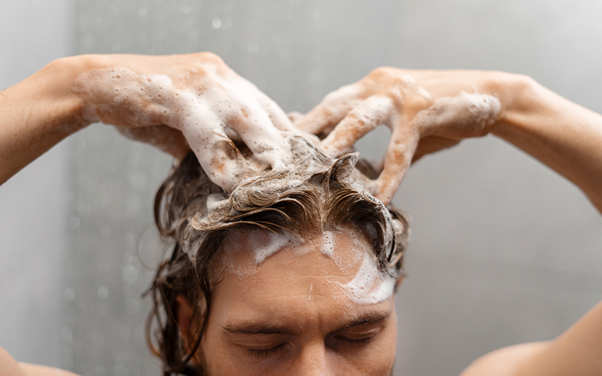A dry, itchy, or flaky scalp is a common and often annoying problem, causing discomfort, flakes on clothes, and even hurting hair health. A dry scalp occurs when it lacks moisture, causing tightness, itchiness, and small, dry flakes. Fixing this requires a focused approach to moisturise, soothe, and bring back the scalp’s natural balance. This guide explores why this condition occurs, as well as the practical steps for dry scalp treatment and therapy.
Understanding the Causes of Dry Scalp
Many things can cause a dry scalp. Weather is one reason, as cold, dry air or air conditioning can strip its natural oils. Washing hair too often, especially with harsh shampoos that contain sulphates, also takes away needed moisture, leaving the scalp open to dryness.
Other common causes include styling products with alcohol, which can dry out the scalp. Not washing hair often enough can let product build-up irritate the scalp. Skin issues such as eczema or psoriasis can also show up as a dry, itchy scalp. Sometimes, not drinking enough water or lacking certain nutrients can cause overall skin dryness, including on the scalp.
Essential Steps in Dry Scalp Treatment
Good dry scalp treatment starts with a gentle, nourishing hair care routine. Switch to a mild, sulphate-free shampoo and conditioner made for dry or sensitive scalps. These products clean without removing natural oils, helping the scalp maintain its moisture barrier. Wash your hair with lukewarm water, not hot.
If you wash your hair daily, try doing it less often, as washing every two to three days allows the scalp’s natural oils to build up. When washing, gently massage your scalp. This helps blood flow and loosens flakes. After washing, gently pat your hair dry with a towel instead of rubbing hard.
Targeted Scalp Therapy for Dry Scalp
Beyond daily washing, scalp therapy for dry scalp can offer direct relief and healing. Natural oils such as jojoba, argan, coconut, or diluted tea tree oil are good choices for a scalp mask or oil treatment to moisturise and nourish the skin. Warm a small amount of oil, apply it directly to your scalp, and gently rub it in. Leave it on for 20-30 minutes, or even overnight, before shampooing. These oils give deep moisture and can calm irritation.
Another beneficial therapy involves using special shampoos or leave-in hair treatment solutions. These may have ingredients such as salicylic acid, coal tar, or zinc pyrithione, making it crucial to follow product instructions for these treatments. Being consistent with these therapies is key to seeing lasting improvement in your scalp’s condition.
Lifestyle Adjustments for Scalp Health
Your overall health affects your scalp. Ensure you drink enough water daily, as good internal hydration shows in healthier skin, including your scalp. Eat a balanced diet rich in healthy fats, vitamins, and minerals, as this supports skin health from the inside.
Use hot styling tools directly on the scalp less often. Try to limit exposure to harsh weather when possible. If you live in a dry place or use air conditioning, a humidifier at home can add moisture to the air. This helps both your skin and scalp. These lifestyle changes support your dry scalp treatment.
When to Seek Professional Help
Many dry scalp issues can improve with home remedies and over-the-counter products. However, the problem may require professional help. If your dry, itchy scalp continues despite regular home scalp therapy for dry scalp, or if symptoms worsen, see a dermatologist or trichologist.
These experts can diagnose hidden problems such as severe eczema, psoriasis, or fungal infections. They can also offer clinic treatments and give advice based on your scalp and hair, ensuring you receive the most effective dry scalp treatment for lasting comfort and relief.
Conclusion
A dry scalp can be annoying, but you can manage it with a focused plan. Understanding its causes, gentle daily care, specific scalp therapy for dry scalp, and helpful lifestyle changes are key. If symptoms don’t improve, professional help is the next step. By consistently following these steps, you can calm irritation, heal your scalp, and create a healthier environment for your hair.
Find lasting relief for dry scalp. Contact Bee Choo Origin for expert scalp therapy for dry scalp solutions.




